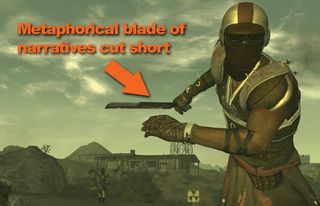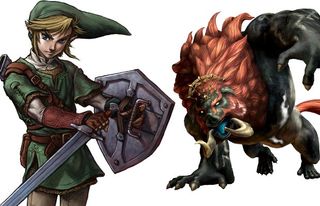If you want to carry on exploring the western wasteland of Fallout: New Vegas after you've finished the game, you'll have to start again from scratch or travel back in time. That's the word from Director Josh Sawyer, who has just clarified recent statements that once the game is done, it's done. There will be no post-endgame exploration, and if you want to complete more side-quests you'll have to go back to an old save, Zelda-style. Or just start again.
The reasoning is that the ending Obsidian wants to give the game will be stronger if the player can't continue after it. But is a strong narrative resolution more important than maintaining the illusion of a real, persistant, living world in a game like this? And how will the probably inevitable DLC get around this? Won't we end up with the same problem of narrative dead-end thatBethesda saddled itself with at the end of Fallout 3, which then resulted in the need for a messy plot retcon with the first add-on? More explanations and quotes are beyond the jump.

Above: Your adventure. Cut short. With a blunt metaphor
"We want to make it a definitive ending. Initially, we talked about trying to support post-game play, but because the changes that can happen at the end of the game are pretty major, this is what it basically came down to: either have the changes feel really major in the end slides and then have them not be very major after the end of the game, or make them really minor and not that impactful."
That's Sawyer's explanation, and in a lot of ways, I agree with his sentiments. Having to re-engineer ahuge open-world in order to accommodate multiple variations of big narrative events would be a nightmare, and having played througha huge open-world for tens of hours, I bloody well want big narrative events come the climax.
But I also - and this is a personal thing, so feel free to disagree - absolutely hate finishing an RPGset in avibrant world which I know contains plenty more stories I haven't even touched yet, and then being forced to reboot that world back to an earlier save in order to see more of it. Yes, I can still play everything without restarting the whole game, but it murders the narrative flow and my sense of progression through a real, reactive world.

Above: "Defeat me all you like. In 20 minutes it's going to mean bugger all, mate"
At the end of a game based entirely around those concepts, essentially being told that my final actions and climactic struggle didn't count for anything (and in fact didn't even happen) as soon as I want to play more is a bit galling, as well as a bit archaic. Fable IIunlocks new quests after the main game has been completed, which lead directly on from the events of the finale. And after 'completion', Dragon Quest VIII even opens up hours-worth of new gameplay that fills in every gap from the game's already huge main story. And that, to me, just feels like a much more evolved way of doing things.
Sawyer explains that Fallout: New Vegas' endings will tell the stories of the game's characters for decades after the main story, and obviously anything the player did post-endgame to change those events (say, killing a character who we've been told lives to old age) would make a mess of things. But surely there's a better, more organic way of doing things than just skipping back to before the last boss fight, like nothing ever happened. That approach felt creaky in A Link to The Past. And what will happen with the DLC? Will it all be set before the ending, thus messing with the levelling and character progression? Will it be based on side-stories and different protagonists? Or will it be another Fallout 3-style retcon?
But what do you think? Would a lack of post-ending exploration be a jolt for you, or could you not care less about narrative flow? And how do you think this means the DLC will turn out? Let me know in the comments, or via our throbbing social portals onFacebookandTwitter.
Source:1up

